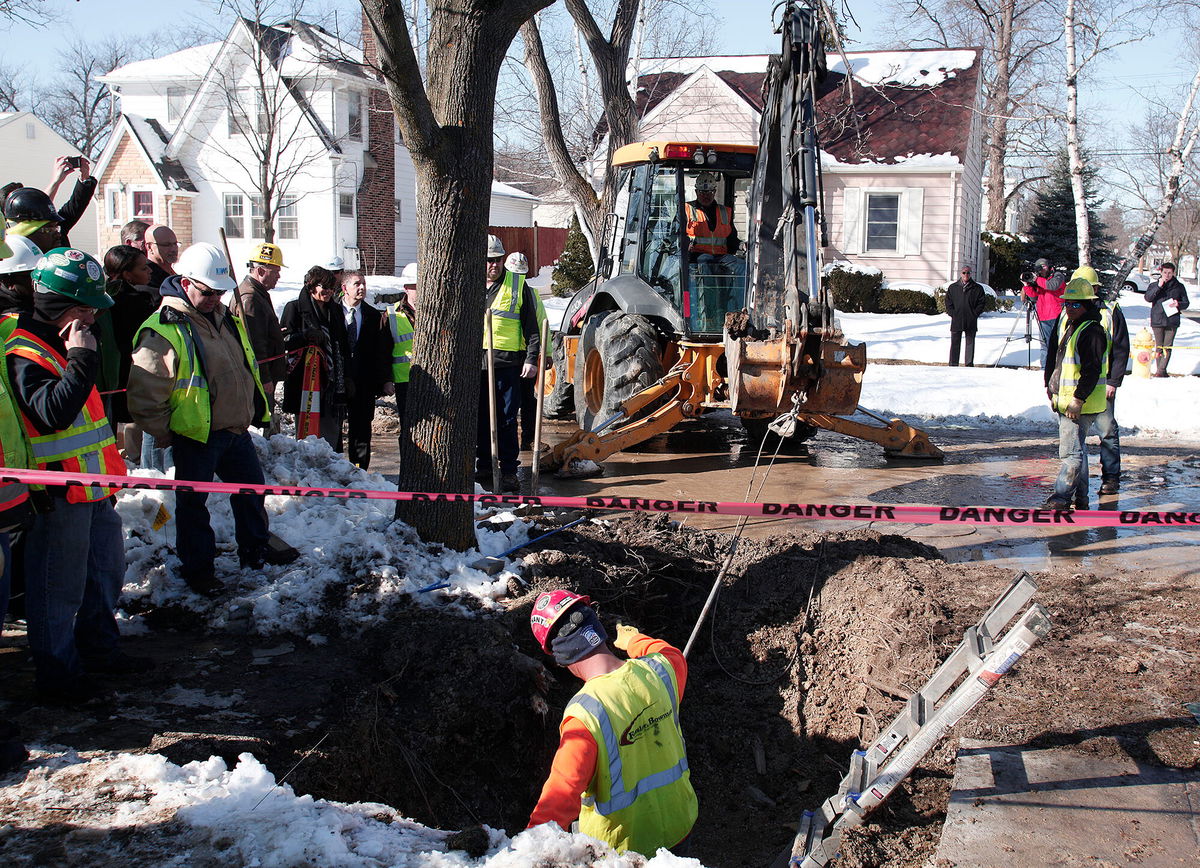Lead pipe replacement could be a big environmental win in bipartisan infrastructure deal

Workers in Flint
By Ella Nilsen, CNN
While some major climate provisions have been stripped out of a bipartisan infrastructure deal between the White House and a group of moderate senators, President Joe Biden’s vow to replace all of the nation’s lead pipes lines is a no-brainer, one of the president’s top environmental officials told CNN.
If money for lead pipe replacement makes it into the package, it could be one of the administration’s few bipartisan wins on environmental issues. The White House says replacing the pipes would reduce lead exposure in 400,000 schools and childcare facilities, and improve the health of American children and communities of color.
“With this bipartisan infrastructure framework, we are still committed to 100 percent lead line replacement,” EPA administrator Michael Regan told CNN on Thursday, “and we believe there will be billions of dollars to invest in other water infrastructure projects as well.”
The deal contains about half of the total money for water infrastructure, compared to Biden’s original American Jobs Plan, but lead pipe removal is still an administration priority. In recent memos obtained by CNN, Biden administration officials, including White House National Climate Advisor Gina McCarthy, still commit to the administration’s original goal of replacing 100 percent of these pipes and service lines with funding from the bill.
Biden’s pledge to eradicate lead pipes and service lines from the nation’s water systems is a big part of the president’s environmental justice commitment to prioritize overlooked and marginalized communities, Regan said.
Regan spoke to CNN Thursday from Michigan, after wrapping up a multi-day trip to the Midwest where he met with local officials about replacing lead pipes and other water quality issues.
Regan said Milwaukee still has about 70,000 lead pipes in the ground, and Flint, Michigan, is still recovering from the fallout of its water crisis, which began in 2014 after officials switched the city’s water source from Detroit municipal water to the Flint River, a process that utilized aging lead pipes.
As a result, residents of Flint were forced to use water with toxic levels of lead. Twelve people ultimately died, dozens were sickened, and studies estimate that as many as 14,000 kids under the age of 6 were exposed to lead, which causes damage to the brain and nervous system.
The crisis led to charges for former Michigan Gov. Rick Synder and eight other state and city officials.
“These communities have gone through a lot, and they’ve been traumatized by a failed system,” Regan said. “Flint has faced a lead crisis, and it’s working its way out of the lead pipes crisis, but they have other water quality challenges that they wanted to discuss with EPA as well.”
Biden is asking Congress for a 20 percent increase in EPA’s 2022 budget, and there’s a potential that more funding for other water infrastructure upgrades could come from a budget reconciliation bill, which can be passed with a simple Democratic majority in the Senate.
“As the president has mentioned, he’s talked about budget reconciliation as a mechanism as well,” Regan said. “He’s looking at all of the tools in his toolbox to continue to pursue the very ambitious agenda that he has for this administration.”
Some of the administration’s other key climate measures, including a clean electricity standard and hundreds of billions in clean energy tax incentives, were not included in the bipartisan framework. While the American Jobs Plan initially proposed $111 billion in total for water infrastructure — $45 billion of which was proposed to be allocated for lead pipe removal and replacement — a framework for the bipartisan deal proposes $55.2 billion to go towards water infrastructure.
In addition to the bipartisan infrastructure bill, the Biden White House and congressional Democrats are also pursuing a budget reconciliation bill that is likely to contain several of the administration’s major climate priorities. US Energy Secretary Jennifer Granholm told CNN’s Victor Blackwell on Thursday that she thinks a clean electricity standard will be able to pass the US Senate through budget reconciliation.
“The bottom line is we’re negotiating that right now, and I think we can get that across the finish line,” Granholm told Blackwell.
The-CNN-Wire
™ & © 2021 Cable News Network, Inc., a WarnerMedia Company. All rights reserved.